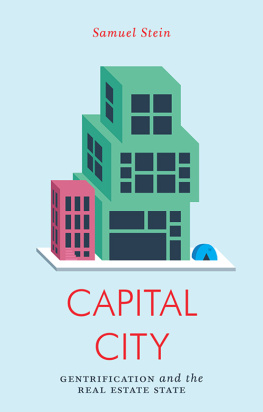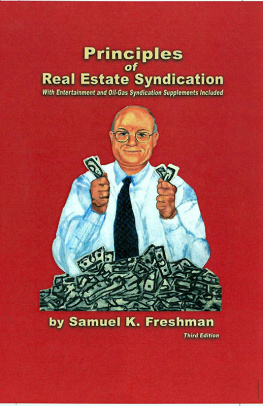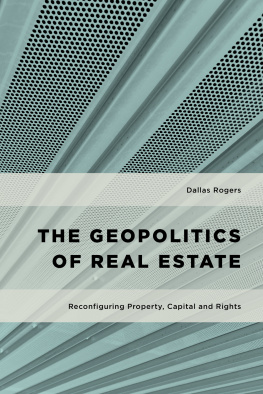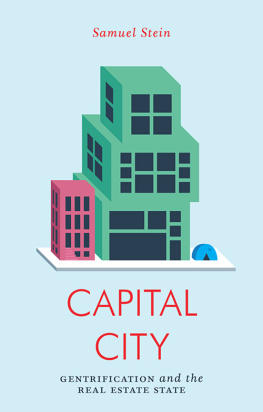Samuel Stein - Capital City: Gentrification and the Real Estate State
Here you can read online Samuel Stein - Capital City: Gentrification and the Real Estate State full text of the book (entire story) in english for free. Download pdf and epub, get meaning, cover and reviews about this ebook. year: 2019, publisher: Verso, genre: Politics. Description of the work, (preface) as well as reviews are available. Best literature library LitArk.com created for fans of good reading and offers a wide selection of genres:
Romance novel
Science fiction
Adventure
Detective
Science
History
Home and family
Prose
Art
Politics
Computer
Non-fiction
Religion
Business
Children
Humor
Choose a favorite category and find really read worthwhile books. Enjoy immersion in the world of imagination, feel the emotions of the characters or learn something new for yourself, make an fascinating discovery.
- Book:Capital City: Gentrification and the Real Estate State
- Author:
- Publisher:Verso
- Genre:
- Year:2019
- Rating:3 / 5
- Favourites:Add to favourites
- Your mark:
- 60
- 1
- 2
- 3
- 4
- 5
Capital City: Gentrification and the Real Estate State: summary, description and annotation
We offer to read an annotation, description, summary or preface (depends on what the author of the book "Capital City: Gentrification and the Real Estate State" wrote himself). If you haven't found the necessary information about the book — write in the comments, we will try to find it.
Samuel Stein: author's other books
Who wrote Capital City: Gentrification and the Real Estate State? Find out the surname, the name of the author of the book and a list of all author's works by series.
Capital City: Gentrification and the Real Estate State — read online for free the complete book (whole text) full work
Below is the text of the book, divided by pages. System saving the place of the last page read, allows you to conveniently read the book "Capital City: Gentrification and the Real Estate State" online for free, without having to search again every time where you left off. Put a bookmark, and you can go to the page where you finished reading at any time.
Font size:
Interval:
Bookmark:


The Jacobin series includes short interrogations of politics, economics, and culture from a socialist perspective, as an avenue to radical political practice. The books offer critical analysis and engagement with the history and ideas of the Left in accessible and popular form.
The series is a collaboration between Verso Books and Jacobin magazine, which is published quarterly in print and online at jacobinmag.com.
Other titles in this series available from Verso Books:
Utopia or Bust by Benjamin Kunkel
Playing the Whore by Melissa Gira Grant
Strike for America by Micah Uetricht
The New Prophets of Capital by Nicole Aschoff
Four Futures by Peter Frase
Class War by Megan Erickson
Building the Commune by George Ciccariello-Maher
The Peoples Republic of Walmart
by Leigh Phillips and Michal Rozworski
Real Estate State

First published by Verso 2019
Samuel Stein 2019
All rights reserved
The moral rights of the author have been asserted
1 3 5 7 9 10 8 6 4 2
Verso
UK: 6 Meard Street, London W1F 0EG
US: 20 Jay Street, Suite 1010, Brooklyn, NY 11201
www.versobooks.com
Verso is the imprint of New Left Books
ISBN-13: 978-1-78663-639-3
ISBN-13: 978-1-78663-637-9 (UK EBK)
ISBN-13: 978-1-78663-638-6 (US EBK)
British Library Cataloguing in Publication Data
A catalogue record for this book is available from the British Library
Library of Congress Cataloging-in-Publication Data
A catalog record for this book is available from the Library of Congress
Typeset in Monotype Fournier
Printed in the US by Maple Press
For my father, Joshua B. Stein (19442012),
who taught me to love cities and question authorities.
On March 25, 1911, fire engulfed New Yorks Triangle Shirtwaist Factory. The bosses had locked the doors and 146 workers were killed. Two days later, the Jewish socialist newspaper The Forward printed an impassioned plea from its editor, Abraham Cahan. After describing the pain felt throughout Manhattans Lower East Side, Cahan wrote that mourners were beginning to see a figure through their tears: the biblical Angel of Death. Who is the Angel of Death? Who is the thug? Who is the mass murderer? Must we again say it is that gluttonous ravager of humanscapital?!
Just over a century later, a public housing complex in West London called the Grenfell Tower burst into flames. Though residents had warned that the building was a firetrap, public authorities allowed it to deteriorate. When the fire started, it quickly accelerated due to the highly flammable cladding that management had added to the buildings exterior in order to make it more attractive to posh neighbors. The fire killed over seventy tenants.
Who is the Angel of Death? Who is the mass murderer? Today, as a century ago, the culprit is capital, rushing in and out of spaces with abandon in search of profit and growth. In 1911, the arsonist was industrial capital, then the dominant force in urban politics. In 2017, it was real estate capital.
Around the world, more and more money is being invested in real estate, the business of building, buying and renting land and property. You can sense it as you walk through most cities, and feel it every time you pay the rent or mortgage.
Global real estate is now worth $217 trillion, thirty-six times the value of all the gold ever mined.
In the United States, homes are changing hands at a rapid pace, but homeownership is at a fifty-year low. In 2016, a record 37 percent of home sales were made to absentee investors.
As renting rises, so do rents. Average move-in rents in the United States have more than doubled over the last two decades.
With wages flat, many peopleeven those with full-time jobssimply cannot afford stable housing.
The force behind these trends is the growing centrality of urban real estate to capitals global growth strategy. Government, particularly at the municipal level, becomes increasingly obsessed with raising property values and redistributing wealth upward through land and rents. Real estate developer Donald Trump becomes first a celebrity and ultimately a president. Taken together, we witness the rise of the real estate state, a political formation in which real estate capital has inordinate influence over the shape of our cities, the parameters of our politics and the lives we lead.
The real estate state is not new, nor is it all-encompassing. Like the carceral state, the warfare state, the welfare state or the administrative state, it is an expression of governmenta component, a bloc, a manifestation, a tendencythat has been around in one form or another for as long as states and private property have existed. Landowners have been determining the shape of cities for centuries, and the idea of housing as a commodityeven as a financial assetis not exactly state of the art. What is relatively new, however, is the outsized power of real estate interests within the capitalist state. As real estate values have risen to absurd heights, so has the political force of real estate capital.
The real estate state is a feature of government at all levels, from the hyper-local to the global. It is most firmly grafted onto municipal governments, however, because that is where much of the capitalist states physical planning is done. City planners therefore sit uncomfortably at the center of this maelstrom. Planners manage the levers of urban change and make crucial decisions about land use, transportation, housing, the environment and more. Though most people have no idea what they actually do, planners have an immense impact on both capitalists and workers in cities and suburbs. In most places, planners are tasked with the contradictory goals of inflating real estate values while safeguarding residents best interests. Capitalism never made planning easy organized money could always thwart the best laid plansbut todays urban planners face an existential crisis: if the city is an investment strategy, are they just wealth managers?
This book is about planners in cities run by real estate. It describes how real estate came to rule, and what planners do under these circumstances. Planners provide a window into the practical dynamics of urban change: the way the state both uses and is used by organized capital, and the power of landlords and developers at every level of government. They also possess some of the powers we must deploy if we ever wish to reclaim our cities from real estate capital. Understanding planners is an important way to understand the capitalist statehow it is built, and what it would take to dismantle it.
While the nexus of planning and real estate is a powerful dynamic in nearly every city, I mostly focus on the United States, and often use New York City as a prime example. I realize there is some risk in focusing on New York: for a US city, it is exceptionally large, dense and expensive. But as the biggest city in the United States, it serves as an example for many other places. Planners from around the country look to New York for new patterns and practices. It is also a place where real estates rule is clearly seen and deeply felt. The rents are outrageous, and the cost of living is among the most persistent public issues. Most of all, though, I use New York because it is my home and the place from which I see the world. I know its gridded streets as well as its crooked politicians, and Ive lived here long enough to feel like the city knows me too.
Font size:
Interval:
Bookmark:
Similar books «Capital City: Gentrification and the Real Estate State»
Look at similar books to Capital City: Gentrification and the Real Estate State. We have selected literature similar in name and meaning in the hope of providing readers with more options to find new, interesting, not yet read works.
Discussion, reviews of the book Capital City: Gentrification and the Real Estate State and just readers' own opinions. Leave your comments, write what you think about the work, its meaning or the main characters. Specify what exactly you liked and what you didn't like, and why you think so.













